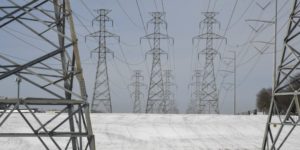
As Texas continues to reel from the crippling winter weather that swept across the Lone Star State in February of 2021, two Texas-based energy corporations have fallen victim to the resulting energy crisis.
On March 1, 2021, Brazos Electric Cooperative of Waco, Texas declared Chapter 11 bankruptcy with the US Bankruptcy Code in the Southern District of Texas. Two weeks later on March 15, Griddy Energy of Houston followed suit.
“These energy corporations have to live on because the state relies on them…You can’t let families stay sitting in the dark by shutting down these corporations.”
Larry Hellie, Hoff Law Offices
Chapter 11 bankruptcy allows a business entity to reorganize its debts while keeping the business alive in an attempt to avoid liquidation. As the entity reorganizes its debts, business affairs, and assets under a Chapter 11 petition, it can also aim to distribute proceeds to creditors over time.
“It’s all a money game,” said Larry Hellie, an associate with Houston-based bankruptcy law firm, Hoff Law Offices. “These energy corporations have to live on because the state relies on them. There’s no way the state would ever let them liquidate. You can’t let families stay sitting in the dark by shutting down these corporations. The state would bail them out or the federal government would.”
“Sure, [Brazos Electric Cooperative and Griddy Energy] will tell the bankruptcy court that they’ve lost revenue,” Hellie said. “But what about their creditors? They’ve lost revenue, too.”
As major energy suppliers dominate the list of the 49 combined unsecured creditors named in both filings with billion-dollar and multi-million dollar claims, energy contractors and suppliers are also seeking trade debts.
Pike Corporation of Mt. Airy, North Carolina is owed $2.5 million from Brazos Electric in trade debts while electrical contractor Ernest P. Breaux of New Iberia, Louisana is also owed $1.3 million. Material suppliers Mica Steelworks of Haltom City, Texas, and Techline of Austin, Texas are owed a combined $2.1 million from Brazos Electric.
Texas-New Mexico Power of Lewisville, Texas is the only contractor listed in Griddy Energy’s bankruptcy petition. The contractor is allegedly owed $150,000.
The aforementioned contracting companies and material suppliers have yet to respond to requests for comment.
Brazos Electric Cooperative’s bankruptcy petition lists an estimated range of 1,000 to 5,000 total creditors, while Griddy estimates no more than 49 creditors. Brazos Electric also estimates $1-$10 billion in total liabilities as Griddy estimates $10-$50 million.
ERCOT named largest creditor amid overbilling allegations
Electric Reliability Council of Texas (ERCOT) — which operates Texas’ electrical grid and manages the deregulated market for 75 percent of the state — is named with the largest unsecured claims in each bankruptcy petition. ERCOT is allegedly owed $1.8 billion from Brazos Electric Cooperative and $29 million from Griddy Energy.
During the severe winter weather in Texas, Virginia-based Potomac Economics — a market monitoring service overlooking Texas’ energy grid — discovered ERCOT overbilled its customers by $16 billion.
According to the Austin American-Statessman, the overbilling occurred because ERCOT “left wholesale prices at the maximum level allowable — $9,000 per megawatt-hour — for about a day and a half too long during the emergency.”
Both Brazos Electric and Griddy Energy have cited ERCOT’s overbilling as contributing factors in filing for Chapter 11 relief.
As stated in a Brazos Electric press release following the bankruptcy filing: “As a result of the catastrophic failures due to the storm, Brazos Electric was presented with excessively high invoices by ERCOT for collateral and for purported cost of electric service, payment of which was required within days.”
Griddy Energy hit with deceptive business allegations
In early March of 2021, Griddy Energy was reportedly dealt a lawsuit filed by Texas Attorney General, Ken Paxton, which claimed the company was misleading customers with deceptive business practices.
According to ABC News, Paxton’s office received over 400 customer complaints against Griddy Energy in under two weeks.
“Griddy did not profit from the winter storm crisis,” Griddy Chief Executive Officer Michael Fallquist said in a statement following the bankruptcy filing on March 15.
“Griddy provides customers access to real-time wholesale electricity prices, allowing them to monitor and adjust electricity usage,” Fallquist said. “Griddy neither influences nor controls the price of electricity; prices are passed on to customers without mark-up.”
Since filing for Chapter 11 bankruptcy, Griddy Energy has also placed blame on ERCOT.
“The actions of ERCOT destroyed our business and caused financial harm to our customers,” said Fallquist. “Our bankruptcy plan, if confirmed, provides relief for our former customers who were unable to pay their electricity bills resulting from the unprecedented prices. “
“ERCOT made a bad situation worse for our customers by continuing to set prices at $9,000 per megawatt hour-long after firm load shed instructions had stopped. Our customers paid 300 times more than the normal price for electricity during this period.”